Usually we're dealing with separation anxiety because new puppy has just left its mom and littermates and his crying and whining can go on for about 5 days.
Do not use the crate as a form of punishment.
Create a crate schedule during the day as a place of interest, by giving him a chew for about 20 minutes in the crate; give him one of his meals once a day in the crate and this becomes a "happy" place.
Dogs, like people need privacy and this will become a den to him.
Personally I do not like to see young puppies crated more than an hour in the morning and an hour in the afternoon, due to still learning house break and they need that time and ability to play, which is why we recommend puppy x-pens for daytime activity.
Nightime crating is easier because puppy is scheduled to sleep, and he can be put beside you to setup a pack leadership. By this I mean when puppy has to look up at you, and you are looking down at him from your bed, it puts you in an Alpha position over puppy.
The crate is also used as a place for puppy to go for 20 minutes (when housebroke an hour) to earn the freedom with you as a reward. For example playtime or obedience school time.
Don't ever let a barking dog out of a crate. You will be rewarding his barking. So you have to teach him to respond to "quiet" I would suggest shaking a pop can of pennies or tapping the top of the crate adding the command "QUIET" if puppy responds with no barking while you count to ten, reward him by allowing him out of the crate.
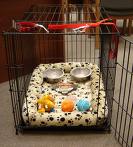 Crate training takes time and patience, and doesn't happen overnight. If you have a dog that absolutely hates the crate try feeding him in the crate or giving the chew bone so he relates to the crate as a "happy" place.
Crate training takes time and patience, and doesn't happen overnight. If you have a dog that absolutely hates the crate try feeding him in the crate or giving the chew bone so he relates to the crate as a "happy" place.
Chewing problems: Chewing relieves stress in a dog. Once he relates that chew time is crate time, he will go to his crate just to encourage YOU to give him his favorite chew.
To recap: you should be giving commands such as get in the crate or go to bed in a happy voice, "Bed" or "crate" give him a treat as soon as he does as asked, example a small piece of hotdog Close the door, if he scratches, let him out and repeat this five times to reinforce training him to go in the crate. In order not to encourage barking, repeat five times and praise puppy before as he goes into crate. Then you continue to repeat the exercise but lengthening the time in between by 5 second, 10 second until you get to 1 minute. Do this exercise as a daytime training exercise not till before bedtime. DO NOT REWARD A BARKING DOG BY LETTING HIM OUT OF THE CRATE!
Also crates are used as safety equipment for transporting your puppy in your car safely.
To find more information on crate training, use Google for a search.
Return to Top
We are assuming the first dog is not dog-aggressive. Should it be work needs to be done with this dog before a second dog can be attained.
The 2nd dog will have a beneficial effect. It will brighten up your current dogs day. If your 1st dog is a well behaved canine citizen, he will be a great role model for your new puppy.
Having a well behaved confident respectful dog already is the best way to acclimate a new dog to the home. If you decide to adopt an older dog there will be several weeks for both animals to adjust.
Note: When your new puppy is purchased, it is in a critical fear imprint stage (from 8-11 week) Anything frightening or disturbing that happens to the new puppy, from the current dog at home may have a lasting and harmful effect on him.
Here's some tips :
If your dog is jealous and possessive, but not actually dog aggressive, we recommend you have a friend (that is not a frequent visitor) drop off the new puppy, (we recommend this to cat owners also) that way your dog or cat will not blame you for the new puppy.
If you have the opportunity to buy an older puppy, have your dog visit before purchasing.
Return to Top
Dogs love garlic! Make your own treats simply and easily using the following recipe:
- 2 cups (260g) whole wheat flour
- 2/3 cup (115g) stone ground cornmeal
- 1/2 cup (100g) sesame seeds
- 3 eggs
- 1/4 cup (60 ml) milk
- 1/2 cup (125 ml) chicken broth
- 2 Tbsp olive oil
- 2 cloves minced garlic
1. Mix flour, cornmeal, sesame seeds in a large bowl.
2. Beat 2 eggs and milk
 3. Add chicken broth, oil and garlic
3. Add chicken broth, oil and garlic
4. Stir wet into dry and mix well to form a firm dough
5. Rest for 15 minutes
6. Place dough on lightly floured surface and roll out to 1/4" thickness
7. Cut into desired shapes (we like smiley faces to give us happy puppy faces)
8. Beat the remaining egg and brush bisquits
9. Place on lightly greased cookie sheet and bake in a 350 degrees F (185 degree C) for 25-35 minutes until golden brown.
10. Cool and don't tell your husband/kids they are for the dog. (joke!) Actually these ARE nutritious for everyone!
Return to Top
Clearing Your Pets Ears of Wax
Use a teaspoon of almond oil, heated in a metal spoon over a candle. Ensure that it is a comfortable temperature and not too hot. Place in each ear. Place a small cotton ball to hold the almond oil in the ear.
 After a few hours, use a rubber syringe or plastic eyedropper to flush out the loosened wax with a solution of equal parts lukewarm water and white vinegar. Repeat for 3 days in a row, then as often as needed.
After a few hours, use a rubber syringe or plastic eyedropper to flush out the loosened wax with a solution of equal parts lukewarm water and white vinegar. Repeat for 3 days in a row, then as often as needed.
Clearing Ear Mites using Garlic Oil Eardrops
Mince one clove of fresh garlic and place in a small heavy put. Add olive oil to one inch above the surface (25 mm) of garlic. Cover. Warm gently on low heat for an hour. Strain through a cheesecloth and store in fridge in covered glass jar.
Warm oil over candle in a metal spoon. Ensure it isn't too hot. After cleaning the ear with almond oil, put several drops of the garlic oil into ear with an eyedropper and plug with a cotton ball. Repeat this 2 X a day for 3 days. Use this 2 x a week thereafter as a preventative.
For a Shiny Coat
Give 1 egg yolk (no white) once a week.
Return to Top





 Consumpion can be all you want. For your dog, start with a Tablespoon in each meal. If your dog gets diarrhea, simply reduce the amount.
Consumpion can be all you want. For your dog, start with a Tablespoon in each meal. If your dog gets diarrhea, simply reduce the amount.
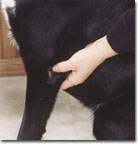 Have you noticed your dog's elbows lately? Are they dry and starting to bald? Does he/she look like they need a trip to the doggie spa? (joke)
Have you noticed your dog's elbows lately? Are they dry and starting to bald? Does he/she look like they need a trip to the doggie spa? (joke)
 To help alleviate this condition, break open Vitamin E capsules and rub into their elbows. This should prevent dryness.
To help alleviate this condition, break open Vitamin E capsules and rub into their elbows. This should prevent dryness.
 Crate training takes time and patience, and doesn't happen overnight. If you have a dog that absolutely hates the crate try feeding him in the crate or giving the chew bone so he relates to the crate as a "happy" place.
Crate training takes time and patience, and doesn't happen overnight. If you have a dog that absolutely hates the crate try feeding him in the crate or giving the chew bone so he relates to the crate as a "happy" place.
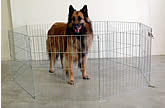 We highly recommend an X-pen being set up for your puppy to play in.This will allow your puppy to play safely from harm until both dogs have established a great relationship.
We highly recommend an X-pen being set up for your puppy to play in.This will allow your puppy to play safely from harm until both dogs have established a great relationship.
 3. Add chicken broth, oil and garlic
3. Add chicken broth, oil and garlic After a few hours, use a rubber syringe or plastic eyedropper to flush out the loosened wax with a solution of equal parts lukewarm water and white vinegar. Repeat for 3 days in a row, then as often as needed.
After a few hours, use a rubber syringe or plastic eyedropper to flush out the loosened wax with a solution of equal parts lukewarm water and white vinegar. Repeat for 3 days in a row, then as often as needed.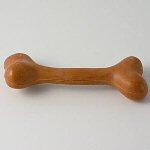 In order for us to let the little one know this is not wanted behavior in using our hands or feet for a chew toy, when puppy goes to bite, put your fingers down his/her throat for an unpleasant experience. He/she will soon get the idea that this playful but unwanted behavior just isn't worth the trouble.
In order for us to let the little one know this is not wanted behavior in using our hands or feet for a chew toy, when puppy goes to bite, put your fingers down his/her throat for an unpleasant experience. He/she will soon get the idea that this playful but unwanted behavior just isn't worth the trouble.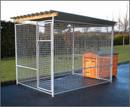 Sure, if you work long and hard at this imaginary boundry, the dog may respond and seem to know what you want, until THAT day, TEMPTATION takes him or her over the line.
Sure, if you work long and hard at this imaginary boundry, the dog may respond and seem to know what you want, until THAT day, TEMPTATION takes him or her over the line.